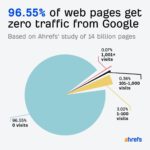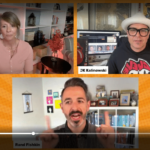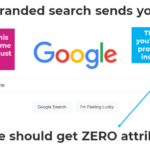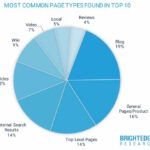Reading Time: 2 min Things are changing quickly when it comes to getting your site to rank well on Google. A big one, as I shared a few months ago, is that 64% of visitors that use Google never end up visiting a traditional website, instead getting the answer from Google itself or from a related Google product (Maps, […]
SEO
Creating “zero click” content
Reading Time: 2 min As I mentioned a few weeks ago, a growing problem with Google is the number of “zero click” searches on there — searches that don’t lead to another click, because Google answered the question for you. It’s generally a good thing for users, but it’s a bad thing for companies wanting to get more website […]
The balance between lift and attribution
Reading Time: 2 min I’ve shared a few times on here how precise attribution of online activities is becoming more and more difficult to track. It feels like companies are collecting every bit of information that they can about us, which is true, but it’s becoming trickier to put all of the pieces together. Ad blockers and cookie policies […]
The majority of Google searches don’t lead to websites
Reading Time: 2 min It’s a trend that has been growing for years, but the number of “zero-click” searches on Google continues to grow (where a zero-click search is one where the user doesn’t ever click through to a website). In a recent post on the SparkToro blog, Rand Fishkin points out that in 2024 only 360 of every […]
Build a brand outside of Google
Reading Time: 2 min There was recently a huge leak from Google that detailed much of how their search algorithm works, and it was quite eye opening. One of the best overviews of the leak comes from Rand Fishkin, and you can read it here. In digging in, he had a few very insightful thoughts that I wanted to […]
Don’t ascribe attribution to Google when other investments drove the real value
Reading Time: 2 min When monitoring your website traffic, it’s easy to look at your sources and see that Google has sent you the most traffic, leading you to think you should double down on it. Maybe you should, but maybe not. There are certainly people that Google sends to your site that you should be thankful for. If […]
Blogs are still among the highest-ranking pages
Reading Time: < 1 min While it’s been well-established that users don’t click on the “blog” page for most sites, having those posts can still be incredibly valuable. The purpose of most blogs (not this one) are to drive people to the website via Google search, and then lead them to the pages that matter (registration, purchase, etc). For those […]
Artwork is signed because it matters who created it
Reading Time: < 1 min I’ve mentioned a few times on here that I’m not a fan of companies that put a “designed by” link in the footer of websites that they create. Google clearly says not to do it, and putting a link there is entirely for the (misguided) advantage of the designer, to the detriment of the site […]
Why should your website rank higher than theirs?
Reading Time: < 1 min A few weeks ago I was chatting with a friend and he was upset that his site wasn’t ranking first on Google for a particular keyword. We ran the search, and sure enough he was in fifth. I proposed a very simple challenge: click the top ranking, and then tell me if his site really […]
Marketing isn’t magic
Reading Time: 2 min I was talking to a friend a few weeks ago that was working with a new company. That company had been outsourcing their SEO (Search Engine Optimization) work to another firm for a few thousand dollars a month, but it was unclear exactly what that other firm was doing. When asked for details on what […]








